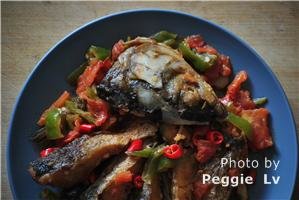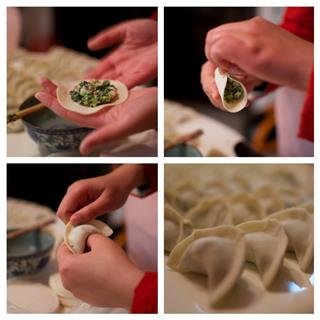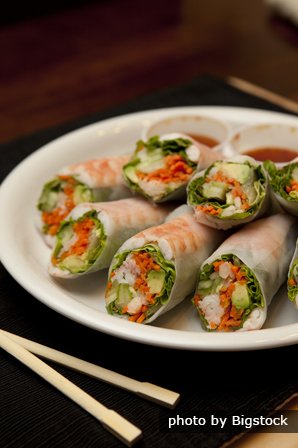Chinese New Year Foods are very important to Chinese people. All family members come together to eat at Spring Festival. Chinese New Year foods are not only delicious, but also steeped in tradition. Chinese dumplings, fish, spring rolls, and niangaoare usually eaten at Chinese New Year.
Fish 鱼 Yú /yoo/
 Beer fish
Beer fish
In Chinese, "fish" sounds like 'surplus'. Chinese people always like to have a surplus at the end of the year, because they think if they have managed to save something at the end of the year, then they can make more in the next year.
Fish can be cooked in various ways such as boiling, steaming, and braising. The most famous Chinese fish dishes include steamed weever, West Lake fish with pickled cabbage and chili, steamed fish in vinegar sauce, and boiled fish with spicy broth.
The Meaning of Various Fish
What fish should be chosen for the New Year feast is based on auspicious homophonics.
Crucian carp: As the first character of ‘crucian carp' (鲫鱼 jìyú \jee-yoo\) sounds like the Chinese word 吉 (jí /jee/ ‘good luck'), so eating crucian carp is considered to bring good luck for the next year.
Chinese mud carp: The first part of the Chinese for mud carp (鲤鱼 lǐyú /lee-yoo/) is pronounced like the word for gifts (礼 lǐ /lee/). So Chinese people think eating carp during the Chinese New Year symbolizes wishing for good fortune.
Catfish: The Chinese for catfish (鲶鱼 niányú /nyen-yoo/) sounds like 年余 (nián yú) meaning ‘year surplus'. So eating catfish is a wish for a surplus in the year. Eating two fish, one on New Year's Eve and one on New Year's Day, (if written in a certain way) signifies a wish for a surplus year-after-year. If only one catfish is eaten, eating the upper part of the fish on New Year's Eve and the remainder on the first day of the new year has the same meaning (上鲶鱼下鲶鱼; 上年余下年余).
The Origin of Eating Fish During the Spring Festival
Once upon a time, in the New Year's Eve meal, fish not only represented the auspicious sound of surplus, but was also thought to repress evil. Dating back to the Han Dynasty (206 BC – 220 AD), fish played a symbolic role in keeping down demons, and were painted on door knockers. In the Tang Dynasty (618–907), all doorknobs, including on house doors, cabinet doors, and case doors, were designed with a fish pattern, which also possessed the same function. This doorknob belief maybe contributed to the tradition that Chinese eat fish for the New Year's Eve meal. However, the demon repression meaning has gradually been forgotten.
How to Eat Fish in the New Year
The fish should be the last dish left with some not eaten up, as this has auspicious homophonics for there being surpluses every year (过年鲶鱼余; 过年年余余). This is practiced north of the Yangtze River, but in other areas, the head and tail of the fish shouldn't be eaten until the beginning of the year, which expresses the hope that the year will start and finish with surplus (新年鱼头鱼尾; 新年余头余尾).
There are some rules for positioning the fish. The head should be placed toward distinguished guests or elders, representing respect. The fish shouldn't be moved. The two people who face the head and tail of fish should drink together as this is considered to have a lucky meaning. Diners can enjoy the fish only after the one who faces the fish head eats first. These customs are observed in a lively and light-hearted spirit, full of laughing and banter.
Lucky Sayings for Eating Fish
Chinese Dumplings 饺子 Jiǎozi /jyaoww-dzrr/

With a long history of more than 1,800 years, dumplings are a traditional food widely popular in China, especially in North China. Dumplings generally consist of minced meat and finely-chopped vegetables wrapped in a thin and elastic dough skin. Popular fillings are minced pork, diced shrimp, fish, ground chicken, beef, and vegetables. They can be cooked by boiling, steaming, frying or baking. Dumplings are a classic Chinese food, and a traditional dish eaten on Chinese New Year’s Eve.
Chinese dumplings look like silver ingots. Legend has it that the more dumplings you eat during New Year celebration, the more money you can make in the New Year. Almost all Chinese people can make dumplings. First they mix the dough, second make the dough into round "wrappers" with a rolling pin, third fill the wrappers with stuffing, fourth pinch the "wrapper" together in a jiaozi shape, and fifth cook them.
Eating Dumplings
Chinese don't eat dumplings with Chinese sauerkraut at Spring Festival, because it implies a poor and difficult future. On New Year's Eve it is a tradition to eat dumplings with cabbage and radish, implying that one's skin will become fair and one's mood will become gentle.
When making dumplings there should be a good number of pleats. If you make the junction too flat, it is thought to purport poverty. Some Chinese put a white thread inside a dumpling, and the one who eats that dumpling is supposed to possess longevity. Sometimes a copper coin is put in a dumpling, and the one who eats it is supposed to become wealthy. Dumplings should be arranged in lines instead of circles, because circles of dumplings are supposed to mean one's life will go round in circles, never going anywhere.
Lucky Saying for Eating Dumplings
Spring Rolls 春卷 Chūnjuǎn /chwnn jwen/

Spring rolls are a Cantonese dim sum dish of cylindrical shape. The filling of spring rolls could be vegetables or meat, and the taste could be either sweet or savory. After fillings are wrapped in spring roll wrappers, the next step is frying, when the spring rolls are given their golden-yellow color. It is a dish especially popular in East China: Jiangxi, Jiangsu, Shanghai, Fujian, Guangzhou, Shenzhen, Hong Kong, etc. Spring rolls get their name because they are traditionally eaten during the Spring Festival.
Lucky Saying for Eating Spring Rolls
Niángāo (Glutinous Rice Cake) 年糕
In Chinese, niangao sounds like "getting higher year by year". In Chinese people's mind, the higher you are the more prosperous your business is. The main ingredients of niangao are sticky rice, sugar, chestnuts, Chinese dates, and lotus leaves. More on niangao>>
Lucky Saying for Eating Niangao
Continue to read Chinese New Year 2014

 Fish is an auspicious Chinese New Year symbol
Fish is an auspicious Chinese New Year symbol
Tidak ada komentar:
Posting Komentar